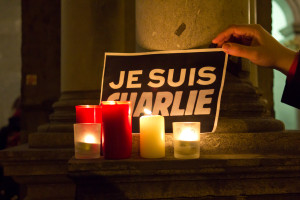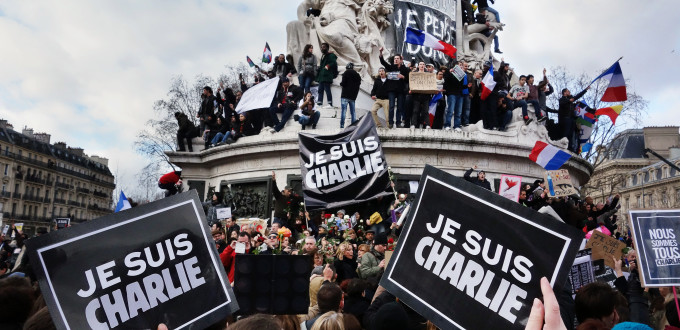
Almost two million people flocked to Paris, including 40 world leaders, while millions more participated in demonstrations across the world, brandishing pencils and filling the streets with impassioned cries of “Je Suis Charlie” (I am Charlie). The hashtag “#jesuischarlie” trended on Twitter, candlelight vigils were held in both Europe and throughout the Americas, and everyone from international politicians to Hollywood celebrities expressed solidarity with the Parisian victims.
This was the widespread response to the Charlie Hebdo shooting, a tragedy that took the lives of 11 employees at a Parisian satirical magazine. An additional 11 individuals sustained injuries. Two masked men forced their way into a morning meeting on January 7th, 2015, opening fire with shouts of “Allahu Akbar” (Arabic for “God is greatest”). The two shooters escaped onto the street, where they then killed a French police officer.
On January 9th, after a nationwide manhunt, these men were identified as Saïd and Chérif Kouachi, brothers with ties to Al-Qaeda’s operation in Yemen. Their capture escalated into a hostage situation in the Dammartin-en-Goële region, outside Paris, that finally ended when both brothers were gunned down while attempting to make a last escape.
Charlie Hebdo has a history of publishing extreme, often anti-establishment material — mocking everything from major religions like Christianity, Judaism, and Islam, to general politics and international affairs. The magazine first began printing in 1968 and then stopped temporarily in 1981, before eventually starting back up in 1992. The January 7th attack was the tragic culmination of years of anger from various Muslim communities over the publication’s oftentimes disrespectful, even blasphemous depictions of Muhammad and other Islamic leaders.
Meanwhile, just over 2,000 miles away, a similar distortion of religion has led to even greater loss of life.
Boko Haram, an Islamic extremist group with a violent history, has been a force of terror throughout northeastern Nigeria since 2009. However, beginning in early 2014, it has seriously escalated its activity. CNN reports that “the Islamist group has said its aim is to impose a stricter form of Sharia law across Nigeria, which is split between a majority Muslim north and a mostly Christian south.”
Boko Haram’s kidnapping of 276 schoolgirls from the small village of Chibok in April of 2014 momentarily drew international attention to the terrorist group, precipitating the “Bring Back Our Girls” movement, most notably on Twitter. Almost a year later however, these schoolgirls have not been found. The terror has not ended– the only thing that has ended are the international cries for change and action.
Nigeria’s hostile environment, in which Boko Haram moves freely from village to village, has caused approximately 1.5 million people to flee from the area. The strategy, leadership, and recruiting process of the terrorist group have grown more sophisticated since its initial rise to prominence in 2009, and certainly since its inception in 2002.
This rapid growth has been nearly impossible to thwart, especially due to the deeply rooted corruption and thus, ineffectiveness of the Nigerian military. Without a strong military presence, Nigeria has been unable to prevent Boko Haram from controlling large portions of land in the states of Borno and Yobe — a total area of almost 20,000 square miles.
The nearly decade-long conflict has received sporadic waves of international attention, especially in the spring of 2014, with the aforementioned kidnapping of the schoolgirls. However, the Baga massacre that led to the death of over 2,000 Nigerians in early January has received limited attention. Most major global news outlets delayed a report on the deaths, choosing instead to focus on the Charlie Hebdo incident. In fact, even the Nigerian papers did not spend much time covering the tragic events.
Few protesters took to the streets of major Western cities in response to the Baga massacre. Hardly any impassioned shouts were heard ringing on the steps of government buildings, calling for action, for peace. And virtually no real action fulfilled the once popular hashtag, “#BringBackOurGirls.”
Why? Well, perhaps because from the Western perspective, they aren’t really ‘our girls,’ as much as our idealistic social media movements would have you believe. What further complicates this disconnect is our inability to explain it. There is no one reason why Westerners more readily connect with other Westerners– why lives lost in Paris are mourned around the world while those lost in Nigeria are hardly mentioned.
Sagal Alisalad ‘15, who was involved in both the Invisible Children movement and in the Road to Recovery SCG, notes that “it’s weird to compare the 13 lost in Paris to the thousands lost in Nigeria. It’s hard to understand why one is grieved more than the other. But it’s very true; people, especially those that follow Western media, often don’t feel connected to ‘third world’ countries like Nigeria. They figure that the recent massacres are just contributing to a list of many other issues that they can’t really alleviate.”
Serena Medor ‘15 adds that “people get behind causes like Kony 2012 because it’s popular at the time. It’s a fad, not something they understand.” It’s true. The “Bring Back Our Girls” movement bears a striking resemblance to the Kony 2012 movement that erupted onto the international stage in March of 2012 but faded quickly once instant solutions proved unattainable.
It’s important to consider that most of the news we receive in the Western world, especially in the United States, comes from a handful of news outlets. With the aid of modern technology, we are able to tailor our selection of news sources to fit our own agendas– what we want to hear, what we feel comfortable knowing. Of course, not everyone engages in such a selection process, but those who do run a dangerous risk, as the insulated bubble of information that results translates readily into complacency.
Rather than compare the Charlie Hedbo shooting with the massacres in Nigeria, we must resolve to pay adequate attention and respect to both. The loss of human life anywhere must be mourned and responded to, not just when it appeals to our Western sensibilities. As international citizens, we must stretch ourselves to be aware and to never sink into complacency. We much hold ourselves to a standard of knowledge, as it is knowledge that leads to compassion and ultimately, to action.

Leave a Reply